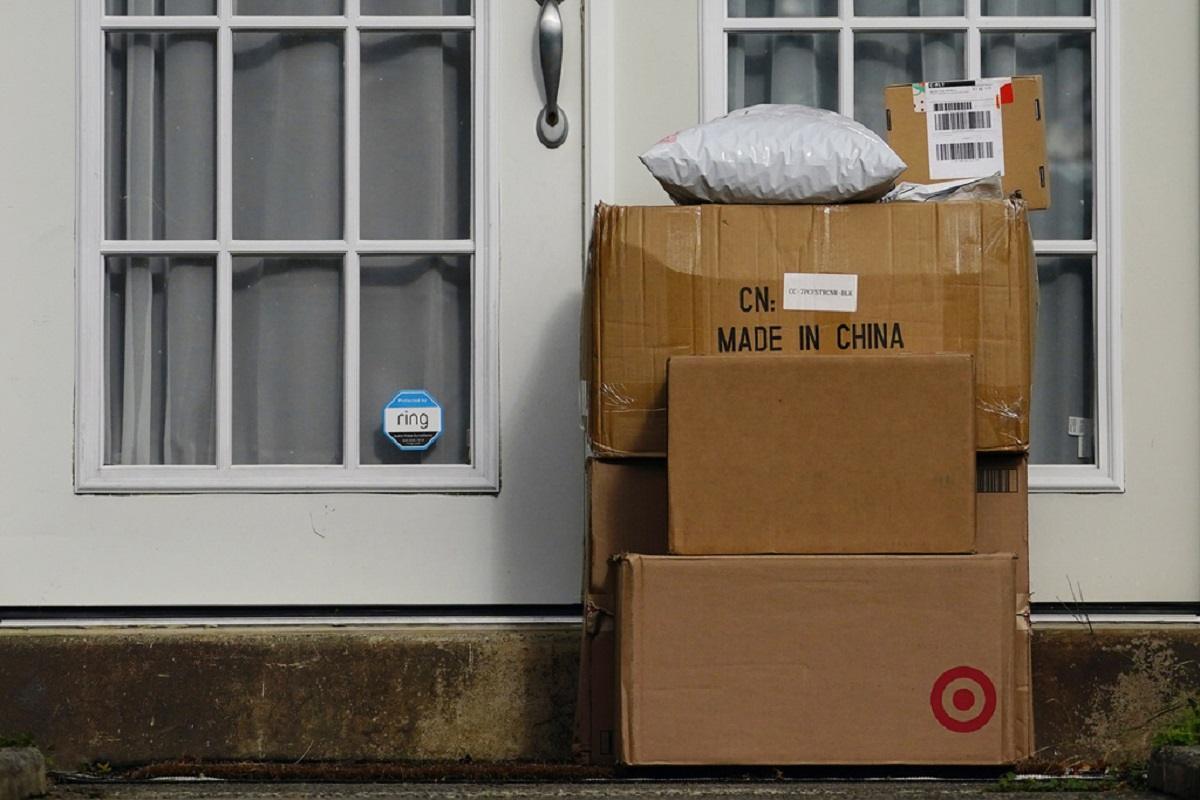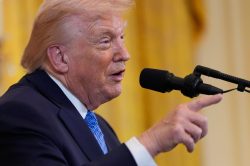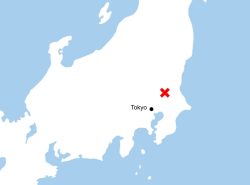
Packages are seen stacked on the doorstep of a residence on Oct. 27, 2021, in Upper Darby, Pa.
13:51 JST, June 25, 2023
WASHINGTON (AP) — Conservatives anxious to counter America’s leading economic adversary have set their sights on a top trade priority for labor unions and progressives: cracking down on the deluge of duty-free packages coming in from China.
The changing political dynamic could have major ramifications for e-commerce businesses and consumers importing products from China valued at less than $800. It also could add to the growing tensions between the countries.
Under current U.S. law, most imports valued at less than $800 enter duty-free into the United States as long as they are packaged and addressed to individual buyers. It’s referred to as the de minimis rule. Efforts to lower the threshold amount or exclude certain countries altogether from duty-free treatment are set to become a major trade fight in this Congress.
“De minimis has become a proxy for all sorts of anxieties as it relates to China and other trade-related challenges,” said John Drake, a vice president at the U.S. Chamber of Commerce, who argues that the current U.S. law should be preserved.
The rule speeds the pace of commerce and lowers costs for consumers. It also allows U.S. Customs and Border Protection to focus its resources on the bigger-ticket items that generate more tariff revenue for the federal government.
The volume of products coming into the U.S. that benefit from the de minimis rule has soared in recent years. Congress raised the U.S. government’s threshold for expedited, duty-free treatment from $200 to $800 in 2016.
The volume of such imports has since risen from about 220 million packages that year to 771 million in 2021 — with China accounting for about 60%, according to the government — and 685 million last year.
“I think everybody’s got to kind of wrap their head around what kind of mistake this was,” Robert Lighthizer, the former U.S. trade representative during the Trump administration, told a House panel last month. “Nobody dreamt this would ever happen. Now we have packages coming in, 2 million packages a day, almost all from China. We have no idea what’s in them. We don’t really know what the value is.”
Lighthizer urged Congress to get rid of the de minimis rule altogether, or take it to a much lower amount, say $50 or $100. He said foreign companies are taking advantage of the “loophole” and “putting people out of work in stores, they’re putting people out of work in manufacturing.”
Last year, House Democrats pushed to prohibit Chinese-made goods from benefiting from the special treatment for lower-cost goods. That move was part of a larger measure that boosted investments in semiconductor manufacturing and research.
In the rush to get a bill passed before the 2022 elections, the Biden administration and Democratic leaders jettisoned provisions without bipartisan buy-in. The trade provision was opposed by important U.S. business groups and key Republican members of Congress, so it didn’t make the final bill.
Fast forward just a few months and it’s clear the political dynamic has shifted — and quickly.
In its first set of recommendations, a new House committee focused exclusively on China called for legislation that would reduce the threshold for duty-free shipments into the U.S. with a particular focus on “foreign adversaries, including the (People’s Republic of China.)”
The Select Committee on the Chinese Communist Party said that exploiting the $800 threshold may be a major avenue through which Chinese companies selling directly to American consumers can circumvent U.S. law designed to prevent the sale of goods made with forced labor. The committee also said Customs and Border Protection “could not reasonably scrutinize” goods sent under the $800 threshold for forced labor concerns because of the sheer amount of products coming in.
The committee is most concerned about retailers Temu and Shein, which ship directly to consumers in the U.S. In a report released Thursday, it said the two companies alone are likely responsible for more than 30% of all de minimis shipments entering the U.S. each day, or nearly 600,000 a day last year.
The committee also has competitiveness concerns. It points out that U.S. retailers such as Gap and H&M paid $700 million and $205 million in import duties, respectively, in 2022. In contrast, virtually all of the goods sold by Temu and Shein are shipped using the de minimis exception in which the importer pays no duty.
Committees with jurisdiction over trade are also signaling a new mindset. Last year, the top Republican on the House Ways and Means Committee, Texas Rep. Kevin Brady, since retired, warned against what he called “hasty changes in reasonable de minimis limits.”
But the Republican now leading the House Ways and Means Committee, Rep. Jason Smith of Missouri, said he wants to “have a lot of conversations” about the $800 threshold.
“Basically, when you’re looking at $800 or less, that’s a free-trade agreement with anyone. And you’re looking at millions of products that come in per day. We need to look at it,” Smith said.
Meanwhile, the Senate has some bills on the issue, which were just introduced this month.
One, from Sens. Sherrod Brown, D-Ohio, and Marco Rubio, R-Fla., would prevent the expedited, tariff-free treatment of imports from certain countries, most notably China and Russia.
The other, from Sens. Bill Cassidy, R-La., and Tammy Baldwin, D-Wis., not only similarly targets China and Russia, but would affect other trade partners. It would do so by reducing the threshold for duty-free treatment to the amount that other nations use.
For example, if another country, say Belgium, which uses the European Union threshold of 150 euros, or about $165 currently, then the U.S. would reciprocate and use that same amount when determining whether goods coming in from Belgium get duty-free and expedited treatment.
Cassidy said it was former President Donald Trump who “really reframed the argument” for Republicans when it comes to trade with China.
“He pointed out that, through a variety of mechanisms, they are taking jobs, not because they are out-competing us, but because they are subsidizing, because they using forced labor, that sort of thing,” Cassidy said.
In early 2022, when Congress was considering putting the de minimis trade provision in the semiconductor bill, several business groups led by the Chamber of Commerce and the National Association of Manufacturers wrote congressional leaders urging them to keep it out. They said the changes would “impose sweeping costs on American businesses, workers and consumers, add new inflationary pressures on the U.S. economy, and exacerbate ongoing supply chain disruptions at U.S. ports.”
Drake said that cutting back the threshold not only would represent a big tax increase for many U.S. small businesses, but many would would have to hire a customs broker to process their shipments.
“There’s a reason Congress raised the level back in 2016,” Drake said. “They knew in addition to it being a competitive advantage for the U.S. business community, they also recognized that collecting duties on these low-value shipments, you know, really wasn’t worth the trouble.”
"News Services" POPULAR ARTICLE
-

American Playwright Jeremy O. Harris Arrested in Japan on Alleged Drug Smuggling
-

Japan’s Nikkei Stock Average as JGB Yields, Yen Rise on Rate-Hike Bets
-

Japan’s Nikkei Stock Average Licks Wounds after Selloff Sparked by BOJ Hike Bets (UPDATE 1)
-

Japanese Bond Yields Zoom, Stocks Slide as Rate Hike Looms
-

Japan’s Nikkei Stock Average Buoyed by Stable Yen; SoftBank’s Slide Caps Gains (UPDATE 1)
JN ACCESS RANKING
-

Keidanren Chairman Yoshinobu Tsutsui Visits Kashiwazaki-Kariwa Nuclear Power Plant; Inspects New Emergency Safety System
-

Imports of Rare Earths from China Facing Delays, May Be Caused by Deterioration of Japan-China Relations
-

Japan Exports Rise in October as Slump in U.S. Sales Eases
-

Japan Pulls out of Vietnam Nuclear Project, Complicating Hanoi’s Power Plans
-

Govt Aims to Expand NISA Program Lineup, Abolish Age Restriction

























